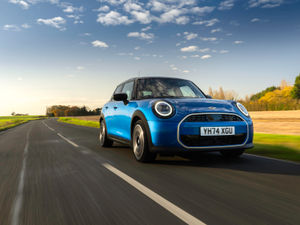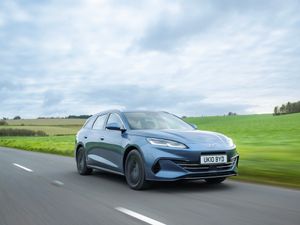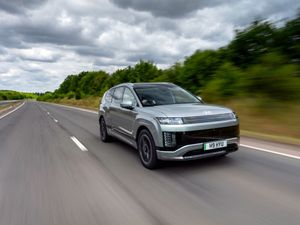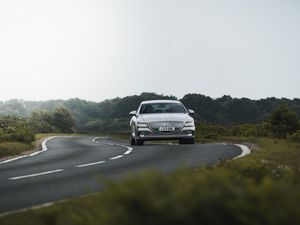UK Drive: The latest Ford Fiesta is still one of the best superminis you can buy
The Ford Fiesta has been udated. Darren Cassey gets behind the wheel to find out if it’s as good as it has always been.
What is it?

Until recently, the Ford Fiesta regularly sat atop the best-selling cars lists. It wasn’t until the Ford Puma went on sale a couple of years ago that it found a challenger, but recent data shows it’s still the most common sight on UK roads, with almost 1.6 million driving around.
It might have fallen out of the top 10 sellers list last year, but the Fiesta is still a huge seller for Ford. It’s small yet practical and, most importantly for this sector, is great value for money. With tweaked styling and improved technology, we’ve been testing the latest version to see if it’s still one of the best all rounders money can buy.
What’s new?

From the outside one of the obvious changes is the tweaked exterior design with more obvious differences between specifications. There are also new technologies such as Matrix LED headlights and a configurable digital instrument display.
As seen elsewhere in the Ford range, the Vignale name is now used as a high-specification package that expands what each trim level offers – rather than as a standalone trim level.
What’s under the bonnet?

One of the Fiesta’s key selling points is its range of electrified engines, which is not something all rivals can necessarily offer at this price point. There are hybrid and mild-hybrid petrol powertrains to choose from.
Our test car came with the 1.0-litre mild hybrid with 123bhp and 170Nm of torque, promising 50mpg on the combined cycle. It felt punchy enough for a car of this size, but would work better with the manual transmission as the seven-speed automatic on our car felt lethargic and dim-witted in urban driving.
What’s it like to drive?

Aside from the auto ‘box, the Fiesta is a fantastic little thing to drive. We were testing the car in ST-Line Vignale specification, meaning it came with the ‘sports tuned suspension’. This normally translates to English as ‘annoyingly jiggly’, but in the Fiesta we generally found it capable of delivering a comfortable ride on all but the most potholed roads.
The steering is well-judged too, being light and easy to use around town without being too fidgety at higher speeds. Speaking of which, the Fiesta does get a bit noisy on the motorway but is otherwise pretty well refined for longer journeys.
How does it look?

The Fiesta’s classic shape will never go out of fashion and in the latest version its subtle changes have given it a simpler, more sophisticated edge. A new bonnet shape increases the height of the nose and the upper grille is larger, while the Ford badge has been moved to the grille.
The new LED headlights give a more modern appearance, while the rear lights have a classy new black surround.
Each trim level now has a more distinctive appearance, with our ST-Line model getting a sporty edge. As such, it gets a new upper grille with a deeper insert and gloss black honeycomb finish, while wide side vents add to the more aggressive look.
What’s it like inside?

Inside the Fiesta is pretty spacious, though the driving position can be slightly awkward for taller drivers. That being said, the quality of the materials on offer was really impressive, though it is perhaps to be expected with our high-spec Vignale version.
The technology is decent for a car of this size, with the new 12.3-inch digital instrument display feeling like something you’d expect to find in bigger, more expensive cars. The infotainment system’s eight-inch screen is starting to feel a little dated by comparison, though.
What’s the spec like?

Our ST-Line Vignale weighed in at £25,270, with features including 18-inch alloy wheels, a unique ST-Line body kit, selectable drive modes, Ford’s Sync 3 infotainment technology with Apple CarPlay and Android Auto, heated front seats and steering wheel, and various driver assistance features.
The final price was £27,970 after optional extras, with the highlights being the Matrix LED headlights (£850) and B&O premium sound system with a wireless charging pad (£425) The parking pack feels like good value at £300 too, bringing front parking sensors and door edge protectors.
While having all of this equipment undoubtedly makes the Fiesta more appealing, it does start to lose its value for money when you consider the basic model starts at around £18,000. For the price of our car, you could get a well-specced Focus…
Verdict

The Ford Fiesta might be losing out in the mainstream sales stakes to the Puma crossover, but there’s still a lot to love about this smart supermini. It’s still sweet to drive and comes with some pretty impressive equipment and technology as standard.
While our model pushed the value for money ethos that makes the Fiesta so appealing, if you’re sensible with your specifications it’s easy to get a smart supermini with everything you need to keep a small family happy.





